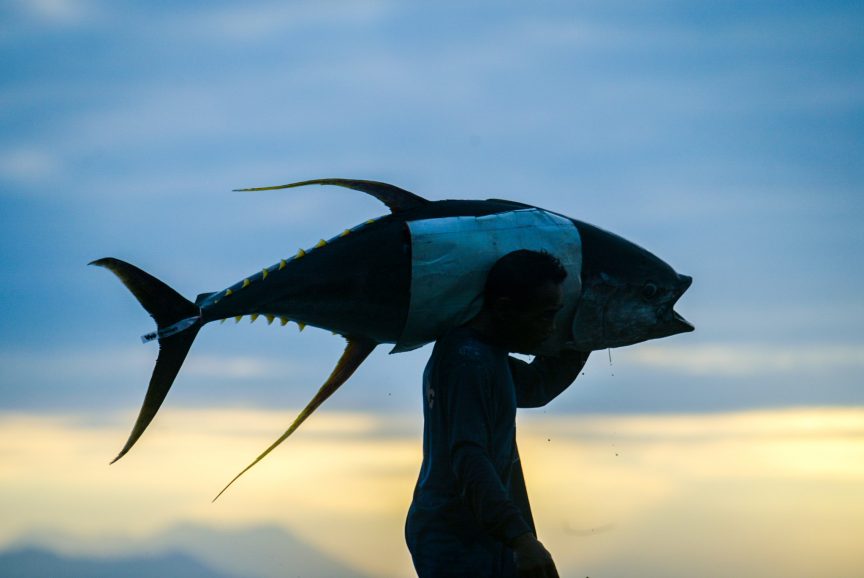Untold stories of the seas: sad plight of tuna fishers
GENERAL SANTOS CITY (MindaNews /01 September) – Merrymaking for the week-long “grand celebration” of the 2024 Tuna Festival in the country’s tuna capital begins on Sunday, September 1, but for some, the celebrations can wait.
The city government has lined up events to celebrate the 56th charter foundation of the city that was built by a burgeoning fishing industry, earning for country’s tuna capital, General Santos City (formerly Dadiangas, the title of “boom city in the south” in the 1990.
No less than the city mayor, Lorelie Pacquiao, went to the airport on Saturday to welcome celebrities from Manila who will be gracing the “grand opening” of the festivities on Sunday evening.
However, for Jonas (who asked that his real name be withheld) whose father has been missing in the high seas for almost a year now, merrymaking can wait until he reunites and is able to hug his long missing father.

Jonas’ father, along with 18 others, set out to fish in the Sulu Sea but their fishing boat FB Jason-7 capsized and sank on September 30 last year. His father was one of two missing fishermen who remain unaccounted. The rest of the crew were rescued.
“I wake up each day anticipating, hoping for his return,” Jonas said, holding back tears, apologetic for his reluctance in sharing the story of his missing father. “Mabigat pa sa dibdib” (With a heavy heart), he quipped during an interview by MindaNews on Sunday.
Jonas, who turned 22 a week ago, hopes that someday he can contribute to improve the conditions of marginalized fisherfolk and give real essence to the celebration “instead of mere merriment that tends to hide the sad plight of many tuna fishermen families.”
He said the families of the missing fishers received no help from the government. His father’s employer gave some financial help, he added.
“Walay health insurance ug wala silay benefits gyud madawat if ever matanggal sila sa trabaho. Wala nay pakialam ang employer” (When they’re separated from work, they have no health insurance and benefits. The employer won’t mind the workers), he said.
Jonas has two siblings — his elder brother, a fisherman and now the family breadwinner, and the youngest, who is still a minor. They live with their mother.
A fisheries student of a government school here, Jonas bemoaned that small-time fishers like his father, who labor and risk their lives in the high seas, continue to get shortchanged and are sidelined in an industry that officials brag to be the city’s economic driver.
“Gusto ko talagang maging bihasa sa field na aking pinasok (I really want to be an expert in the field I have chosen) and also to help those marginalized fisherfolk na magkaroon ng voice and also matuonan ng pansin ang ang problema sa (to have a voice and their problems attended to in the) fisheries sector,” he said.
The same sentiment was aired by 52-year old Jun Seno as he recalled his days as a handline tuna fisherman more than a decade ago. He shared his experience as he carefully hand-stitched the soles of a pair of leather shoes.

The tuna hand-liner turned neighborhood handyman was back to his old craft – shoe repair, which he learned when he was 14. An abdominal ailment forced Seno to abandon tuna fishing in 2009.
After he underwent surgery, he lost the needed strength to fish and lost his savings as well,” he said last Friday.
He said one needs to be healthy when setting out to fish tuna because it is to each his own out there.
“How can you pull on board a 60 kilogram tuna if you lack the strength?” he pointed out. To fetch a good price, tuna must be of best quality and to maintain such requires careful handling of the fish, he explained.
He described his former work as “more difficult than enjoyable,” referring to the life he led in the open sea aboard a 70-meter boat. He said he was fortunate that he remained single so no family would suffer in case something happened to him.
“It is a one-day millionaire experience,” he said of how he and his colleagues set out into the open sea, earn money, usually just enough for a drinking spree and when the money runs out, go back to fish again.
Seno said they get a fifth as their share of the proceeds of their individual handline catch, which usually amounts only to five to eight thousand pesos.
The financier of the fishing trip, usually the boat owner, gets the bigger share as “they pay for our food provisions, fuel and other expenses, including cash advances that fishermen leave to their families,” he said.
Fishing authorities estimate that there are more than 70,000 handline fishermen in the city and about 3,500 fishing boats, which are owned by individuals and fishing companies that also have the bigger purse-seine vessels, known as onay.
Records of the Bureau of Fisheries and Aquatic Resources (BFAR) show that in 2022, tuna accounted for 10.25 percent of the country’s fisheries production.
With the more than 475,000 metric tons of tuna landed in 2022, BFAR officials said the Philippines became one of the world’s leading tuna producers.
The country exported more than 107,000 metric tons of tuna in the same year, Agriculture Undersecretary for Fisheries Drusila Esther Bayate said in her message at the closing of the 23nd National Tuna Congress in General Santos City, last year. “Nakaka-proud talagang maging Filipino (It makes us proud to be Filipino),” she said. (Rommel G. Rebollido / MindaNews)



No comments:
Post a Comment